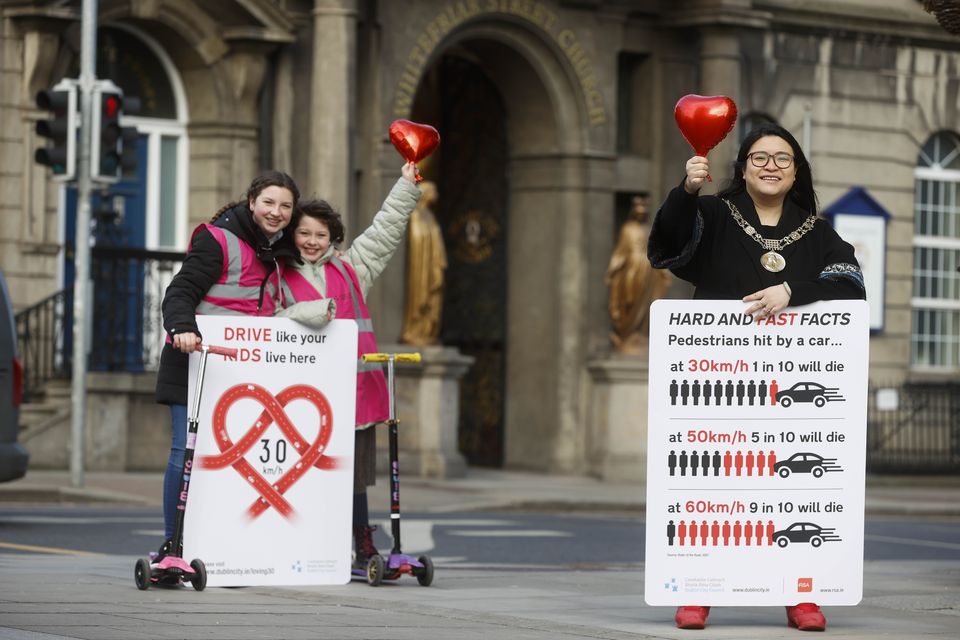Politics
Campaigners Demand Default 30km/h Speed Limit Outside Dáil

Campaigners will gather outside the Dáil on October 2, 2023, to protest against what they perceive as a reversal by the Government on crucial road safety measures. The Love30 campaign, supported by the Dublin Commuter Coalition and over 20 other organizations, is advocating for the immediate implementation of a default speed limit of 30km/h in urban areas. The rally is set to commence at 10:30 AM on Kildare Street, following a presentation to members of the Oireachtas.
The demonstration aims to draw attention to the increasing number of fatalities and serious injuries among vulnerable road users, including pedestrians and cyclists. Under the Road Traffic Act 2024, a nationwide default 30km/h speed limit was initially planned. However, the Department of Transport announced this summer that local authorities would have the discretion to decide where to enforce these limits.
Sean Canney, Minister of State at the Department of Transport, stated, “There is no backpedalling on 30km/h urban limits. The strategy gives local authorities the tools to implement these safer speeds, and the Department will support them in doing so.” Despite this assurance, Tipperary County Council has already indicated it will not adopt the 30km/h limit across its towns and villages, raising concerns among campaigners that other councils may follow suit.
Delays are also reported for other road safety measures, including the installation of red light cameras and high-tech devices to detect mobile phone use and unbelted drivers. Jason Cullen, chairperson of the Dublin Commuter Coalition, emphasized the need for government action, stating, “Government ministers have the power to make our roads safer for all users with the stroke of a pen. 2025 has seen a tragic rise in vulnerable road user deaths, some of which may have been preventable if they had the political will to enact the default 30km/h urban speed limit.”
The Love30 campaign argues that slower speeds not only save lives but also lead to reduced noise pollution, lower emissions, and safer streets for children, elderly individuals, and people with disabilities. Maireád Forsythe, a campaigner with Love30, highlighted the successful implementation of lower speed limits in cities such as London, Paris, and Brussels, noting that in Wales, a default lower speed limit has resulted in a 28% reduction in casualties and fatalities.
Local community groups are joining the protest, including residents from areas around schools. Ciara Eccles, representing the Ballyhooly Road and Summerhill North Residents Association in Cork, expressed concern for local children, stating, “The children attending the four schools on our road and the eight nearby schools are in constant danger from speeding traffic. So too are our many older residents.”
The rally has garnered support from a broad coalition of cycling groups, residents’ associations, environmental advocates, and road safety organizations, including An Taisce, Cycling Ireland, and the Irish Road Victims Association. A recent report from the Road Safety Authority underscores the urgency of the issue, revealing that a pedestrian struck at 50km/h has a 30% chance of dying, compared to just 5% at 30km/h.
Advocates of the Love30 campaign emphasize the broader benefits of lower speed limits, including quieter streets and enhanced accessibility, making urban areas safer for all residents, particularly children and the elderly.
-

 Top Stories3 months ago
Top Stories3 months agoTributes Surge for 9-Year-Old Leon Briody After Cancer Battle
-

 Entertainment4 months ago
Entertainment4 months agoAimee Osbourne Joins Family for Emotional Tribute to Ozzy
-

 Politics4 months ago
Politics4 months agoDanny Healy-Rae Considers Complaint After Altercation with Garda
-

 Top Stories4 months ago
Top Stories4 months agoIreland Enjoys Summer Heat as Hurricane Erin Approaches Atlantic
-

 World5 months ago
World5 months agoHawaii Commemorates 80 Years Since Hiroshima Bombing with Ceremony
-

 Top Stories3 months ago
Top Stories3 months agoNewcastle West Woman Patricia Foley Found Safe After Urgent Search
-

 Top Stories5 months ago
Top Stories5 months agoFianna Fáil TDs Urgently Consider Maire Geoghegan-Quinn for Presidency
-

 World5 months ago
World5 months agoCouple Convicted of Murdering Two-Year-Old Grandson in Wales
-

 World5 months ago
World5 months agoGaza Aid Distribution Tragedy: 20 Killed Amid Ongoing Violence
-

 World5 months ago
World5 months agoAristocrat Constance Marten and Partner Convicted of Infant Murder
-

 Top Stories4 months ago
Top Stories4 months agoClimbing Errigal: A Must-Do Summer Adventure in Donegal
-

 Top Stories4 months ago
Top Stories4 months agoHike Donegal’s Errigal Mountain NOW for Unforgettable Summer Views









